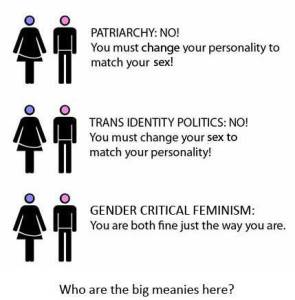Soy filóloga, tengo también un titulo de derecho y he practicado derecho en
el Reino Unido como abogada (solicitor) durante 9 años y trabajo actualmente de
traductora por lo que me preocupan especialmente los temas lingüísticos y
legales.
Me pongo en contacto con ustedes, Ministerio de Igualdad,
como mujer afectada, feminista preocupada, y como votante de este gobierno,
para pedir que reflexionen acerca de la propuesta de Ley Orgánica para la
Igualdad de las personas LGTBT y para la no discriminación por razón de
orientación sexual, identidad de género, expresión de género o características
sexuales cuyo trámite se encuentra actualmente en consulta pública previa a la
elaboración de su propio proyecto normativo.
En España nos consideramos muy afortunadas por tener una Ley
contra la Violencia de Género que, no siendo perfecta, tiene una
perspectiva marcadamente feminista ya que se establece que la mujer sufre
violencia por el hecho de ser mujer (sexo) por parte de los hombres y esta
violencia es diferente a otros tipos de violencia.
Tenemos al menos un precedente en España de 2017 en el
que una mujer presentó una serie de denuncias contra su entonces marido por
malos tratos, y finalmente culminó con una petición de divorcio. Este era un
caso claro de Violencia de Género. Sin embargo, el proceso duró 7 siete años,
durante los cuales el acusado emprendió un proceso de cambio de sexo
(incluyendo hormonación y operaciones). Actualmente el caso aun no se ha
resuelto, pero la baza de la defensa es establecer a su cliente como mujer
desde al menos durante la etapa en la que se empezaron a producir los malos
tratos. https://www.diariovasco.com/gipuzkoa/201705/22/acusado-violencia-genero-cambia-20170522010411-v.html
Hay otros casos similares en los que hombres se han visto
envueltos en juicios donde su resultado se ha visto favorecido por
identificarse como mujeres.
Esto ha pasado cuando aún la autoidentificación (sin
hormonación ni operaciones) no es sencilla. Con su nueva ley van a conseguir facilitarlo al máximo ya
que lo único que pedirán de los que se quieren aprovechar de agujeros en la
legislación es su palabra.
Es conocido que abogados ya están asesorando a sus
clientes sobre cómo sacarle el máximo partido a esta ley si llega a aprobarse.
¿Cómo van a hacer frente a los casos de Violencia de Género si los acusados se
auto identifican como mujeres?
¿Cómo les va a ser posible establecer desde cuándo se les
debe considerar mujeres si, por ejemplo, aseguran sentirse así desde que
nacieron? ¿Cómo van a proteger a las mujeres en general de la violencia
estructural que sufrimos si no podemos diferenciar entre los causantes de la
violencia (hombres) y víctimas (mujeres)?
También mostrarles mi preocupación por la pérdida de
seguridad en los espacios seguros para la mujer como baños y vestuarios.
No porque en estos lugares puedan entrar personas transexuales, sino porque
esta ley incluye la autodeterminación del género, y además, la obligatoriedad
de permitir a las personas entrar en espacios segregados por sexo, en función
de esa identidad sentida, que en ningún momento tiene que manifestarse en su
físico, apariencia, ropa, nombre, etc. Esto evidentemente abre la puerta a que
cualquier hombre pueda entrar en un lugar seguro para la mujer alegando
simplemente sentirse mujer. No todos los hombres son violadores, mirones,
acosadores… pero los que sí lo son podrían usar este derecho en su beneficio, y
las mujeres no podríamos quejarnos o denunciar ya que esta ley le ampara y él
podría denunciarte a ti por delito de odio. ¿Han pensado qué va a pasar en
discotecas, en bares, pubs y demás sitios donde se bebe alcohol? ¿Han pensado
que, para nosotras, el baño de mujeres es, en muchas ocasiones, un espacio
seguro al que acudimos para refugiarnos? ¿Se han preguntado en algún momento
cómo esto afectará negativamente únicamente a las mujeres y especialmente las
que sufran alguna discapacidad o incontinencia urinaria?
 La foto a la derecha es una selfie que se ha hecho un
trans canadiense llamado Jessica Yaniv en un cuarto de baño de mujeres, el tal
Jessica esta obsesionado con los espacios íntimos femeninos hay bastantes por
ahí como elle… ¿De verdad quieren facilitarles a hombres como él acceso a
espacios donde sus mujeres o sus hijas se están cambiando o atendiendo as sus
necesidades más intimas? Esto es absurdo, por favor. Reflexionen. La
autodeterminación de género unida a ese resto de detalles es un peligro para
las mujeres.
La foto a la derecha es una selfie que se ha hecho un
trans canadiense llamado Jessica Yaniv en un cuarto de baño de mujeres, el tal
Jessica esta obsesionado con los espacios íntimos femeninos hay bastantes por
ahí como elle… ¿De verdad quieren facilitarles a hombres como él acceso a
espacios donde sus mujeres o sus hijas se están cambiando o atendiendo as sus
necesidades más intimas? Esto es absurdo, por favor. Reflexionen. La
autodeterminación de género unida a ese resto de detalles es un peligro para
las mujeres.
La opresión que sufrimos las mujeres durante siglos y a
lo largo del mundo ha hecho que no podamos acceder todavía a los trabajos y
puestos de responsabilidad que tienen los varones. El techo de cristal
que existe en todas las esferas de poder de la sociedad es innegable y solo hay
que ver las estadísticas. El feminismo, tras años de lucha, ha conseguido que
existan cuotas reservadas para las mujeres, listas cremallera (como en su
partido), etc, que reservan esos puestos para las mujeres basándose en la
paridad. A esos puestos no hemos podido acceder nunca debido a nuestro sexo (ya
que parimos, debemos criar a los hijos y no trabajar), no ha sido debido a ninguna
identidad sexual ni género expresado. La opresión se debe al sexo. Y ahora, al
declararse “mujer” solo con la palabra, y con la cobertura legal que esta ley
brinda, cualquier hombre podrá acceder a estos puestos. Los que tanto nos ha
costado conseguir. Esta ley es un paso atrás en el feminismo.
Recientemente ha transcendido que el premio Ondas a “la
mejor interpretación femenina” ha sido otorgado a tres trans que son hombres (https://www.lasexta.com/noticias/cultura/protagonistas-serie-veneno-ganadoras-premio-ondas-mejor-interprete-femenina_202010285f99d64b9a1c4e00015c0926.html). Como si no fuera ya bastante difícil a las actrices acceder a roles de
envergadura, ahora premios designados para mujeres se los dan a los hombres.
¿Porque no pudieron darles el premio a los mejores interprete masculino?
Como mujer que sufre artritis reumatoide (siete de cada
10 personas que padecen esta enfermedad son mujeres) surgen muchas dudas
respecto a la autodeterminación del género y la investigación médica. ¿Cómo
afectará la autodeterminación de género en la investigación de enfermedades
u otras patologías de aquí en adelante? Desde la comisión europea en
proyectos tan importantes como el H2020 (Horizonte 2020) se valora
positivamente que todos los proyectos de investigación incluyan individuos de
ambos sexos (ej. en experimentos en laboratorio con especies modelo como las
ratas). ¿Por qué ahora esto no es trasladable a la especie humana? Por ejemplo,
¿qué ocurrirá con estudios recientes que están encontrando diferencias en la
tasa de envejecimiento entre hombres y mujeres? ¿Cómo vamos a afrontar el estudio
de enfermedades que aparecen con diferente frecuencia en hombres y mujeres de
avanzada edad si no estudiamos dichas patologías de forma correcta?
Esta ley pone el peligro el avance de la investigación al
proponer que las personas puedan figurar según su sexo sentido y no según su
sexo biológico en dichos estudios.
Se considera que el sexo es una realidad científica;
admitir otra cosa en base a un sentimiento nos lleva a una ficción, es algo que
no existe. Es así incluso aunque una persona se someta a tratamiento hormonal o
a cirugía.
Así, con esta ley se ven verdaderos contrasentidos, como
el hecho de que una mujer que se auto identifique como hombre y que se quede
embarazada pasará a ser “un hombre embarazado”. Esto es una falsedad y es algo
anticientífico, puesto que en la especie humana sólo tienen capacidad de gestar
y dar a luz las hembras, o sea las mujeres. Se nos borra una vez más.
Esto por no hablar del nuevo lenguaje que se pretende
adoptar: llamar a las mujeres “personas gestantes” o “seres menstruantes”
supone que habrá “hombres que sufran estos procesos”; o sustituir las palabras
madre o padre por progenitor o progenitora. Todo esto nos lleva otra vez al
borrado e invisibilización de las mujeres.
Se habla de “expresión de género” como la forma en que
una persona expresa su identidad sexual a través de expresiones, vestimentas
gestos, conductas, etc. Este concepto me parece impreciso y no demuestra nada,
puesto que en la actualidad esos gestos, vestimentas no tienen por qué suponer
que una persona es de un sexo u otro; piénsese como desde hace bastantes años,
el pantalón supone una prenda masivamente adoptada por las mujeres, o en el caso
contrario, los zapatos de tacón, que en la antigüedad los llevaban hombres. Y,
¿qué son conductas de hombres o mujeres?, ¿el temperamento?, ¿el mostrar
sensibilidad?
La autoidentificación de género perpetúa y valida los
roles de género. El feminismo considera que los roles de género, el género, es
una serie de características construidas que separa las personas en dos
categorías, siendo el género femenino la categoría oprimida, por las
características atribuidas a la misma. Por tanto el validar los roles de género
es contrario al feminismo y socava totalmente los derechos por los que las
feministas hemos luchado durante siglos.
Por ello, porque lo creo verdaderamente, les pido que
reflexionen sobre esta ley con perspectiva feminista teniendo en cuenta los
avances legales del feminismo. Pregúntense por favor si quieren ser un
ministerio feminista o perjudicar la lucha feminista y llevarnos a dar pasos de
gigante hacia atrás. Si eligen la segunda opción, quizás conservarán a esos
votantes trans-activistas, pero les recuerdo que las mujeres somos el 51% de la
población y NO NOS VAMOS A DEJAR BORRAR. No votaremos a un partido que nos
borra, por mucho que lo vistan de igualdad.
Gracias ACCION FEMINISTA por proporcionar modelos para hacer estos comentarios, en su web en
https://drive.google.com/file/d/15_oHb6WvEn3O-BeRJbKY-0bhjKKb4oyo/view










